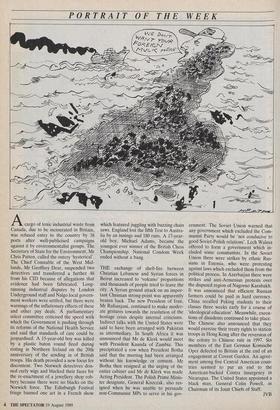PORTRAIT OF THE WEEK
A cargo of toxic industrial waste from Canada, due to be incinerated in Britain, was refused entry to the country by 38 ports after well-publicised campaigns against it by environmentalist groups. The Secretary of State for the Environment, Mr Chris Patten, called the outcry 'hysterical'. The Chief Constable of the West Mid- lands, Mr Geoffrey Dear, suspended two detectives and transferred a further 48 from his CID because of allegations that evidence had been fabricated. Long- running industrial disputes by London Underground staff and Nalgo local govern- ment workers were settled, but there were warnings of the inflationary effects of these and other pay deals. A parliamentary select committee criticised the speed with which the Government is pushing through its reforms of the National Health Service and said that standards of care could be jeopardised. A 15-year-old boy was killed by a plastic baton round fired during rioting in Northern Ireland on the 20th anniversary of the sending in of British troops. His death provided a new focus for discontent. Two Norwich detectives don- ned curly wigs and blacked their faces for the re-enactment of a jewellery shop rob- bery because there were no blacks on the Norwich force. The Edinburgh Festival fringe banned one act in a French show
which featured juggling with buzzing chain saws. England lost the fifth Test to Austra- lia by an innings and 180 runs. A 17-year- old boy, Michael Adams, became the youngest ever winner of the British Chess Championship. National Condom Week ended without a bang.
THE exchange of shell-fire between Christian Lebanese and Syrian forces in Beirut increased to 'volcano' proportions and thousands of people tried to leave the city. A Syrian ground attack on an impor- tant Christian strong-point was apparently beaten back. The new President of Iran, Mr Rafsanjani, continued to make moder- ate gestures towards the resolution of the hostage crisis despite internal criticisms. Indirect talks with the United States were said to have been arranged with Pakistan as intermediary. In South Africa it was announced that Mr de Klerk would meet with President Kaunda of Zambia. This precipitated a row when President Botha said that the meeting had been _ arranged without his knowledge or consent. Mr Botha then resigned at the urging of the entire cabinet and Mr de Klerk was made Acting President. The Polish Prime Minis- ter designate, General Kiszczak, also res- igned when he was unable to persuade non-Communist MPs to serve in his gov- ernment. The Soviet Union warned that any government which excluded the Com- munist Party would be 'not conducive to good Soviet-Polish relations'. Lech Walesa offered to form a government which in- cluded some communists. In the Soviet Union there were strikes by ethnic Rus- sians in Estonia, who were protesting against laws which excluded them from the political process. In Azerbaijan there were strikes and anti-Armenian protests over the disputed region of Nagorno Karabakh. It was announced that efficient Russian farmers could be paid in hard currency. China recalled Peking students to their classes three weeks early for a course of `ideological education'. Meanwhile, execu- tions of dissidents continued to take place. The Chinese also announced that they would exercise their treaty rights to station troops in Hong Kong after the reversion of the colony to Chinese rule in 1997. Six members of the East German Komische Oper defected to Britain at the end of an engagement at Covent Garden. An agree- ment among five Central American coun- tries seemed to put an end to the American-backed Contra insurgency in Nicaragua. The United States appointed a black man, General Colin Powell, as Chairman of its Joint Chiefs of Staff.
JVB


















































 Previous page
Previous page